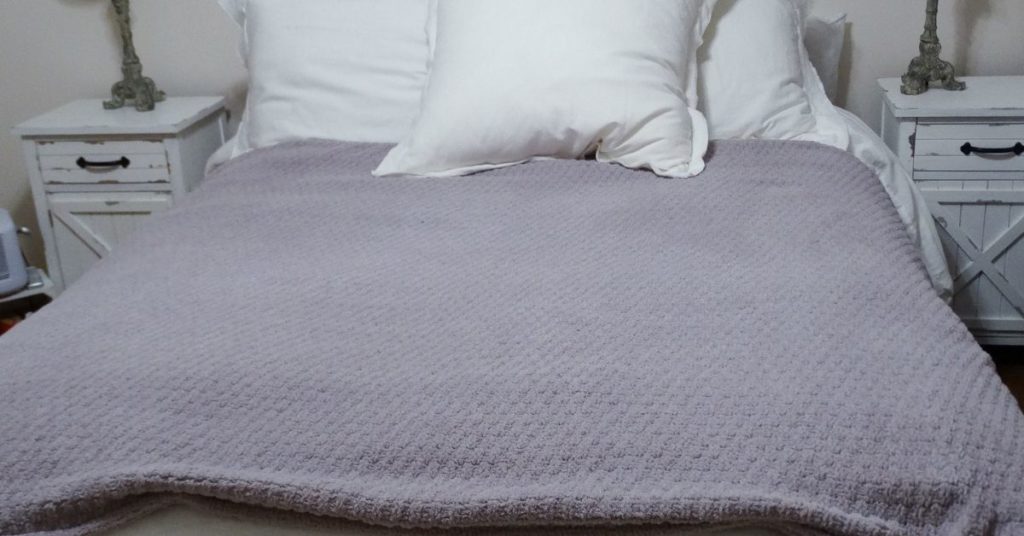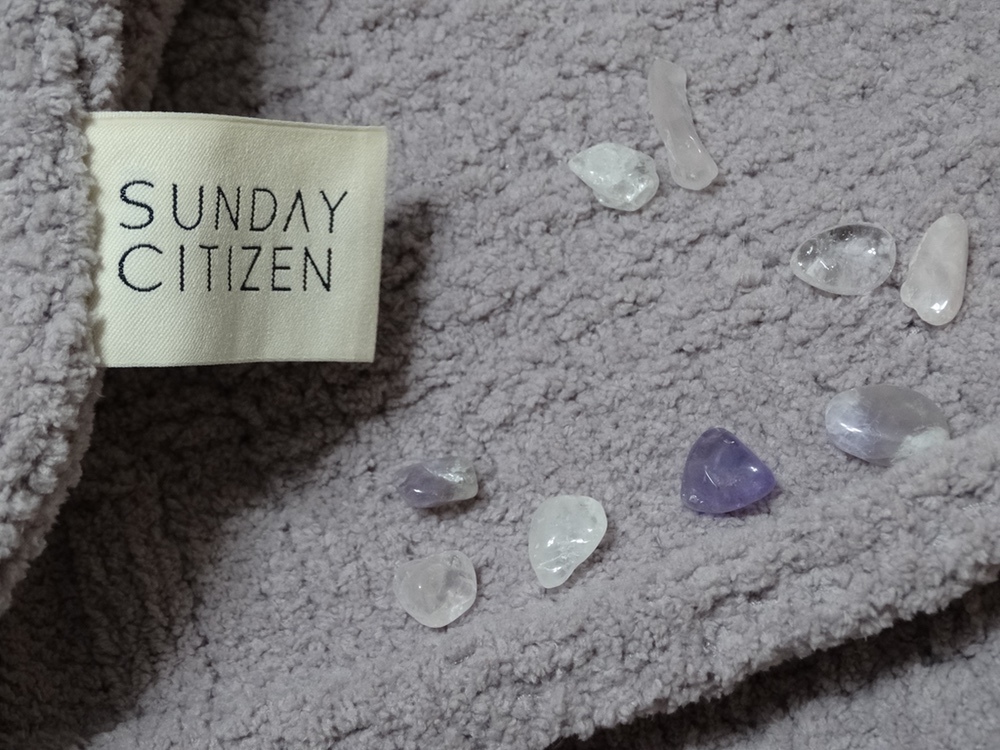Last Updated on June 29, 2022 by Rebecca Huff
Why do weighted blankets work for some people with anxiety and sleep disorders? Does research back up all the user-reported benefits? How do you know if it will work for you and which one is best for your specific needs?
People have been telling me about weighted blankets and asking me if I've tried them for years. While I believed the theory made sense, I wasn't necessarily looking for one for myself. That was before my kids and my husband both expressed an interest. So, when Sunday Citizen sent me one to try, of course, I had to see…
What was all the hoopla about? I found myself wondering why do weighted blankets work? I mean, is there any proof that they help with anxiety, and if so, how?
What I discovered answered all my questions. There are so many reports on how and why they work.
Then I thought back to sleeping over at my Grandma's house. Her home was heated with a wood stove. The warmth didn't reach the attic bedroom where I slept snuggled deep under a pile of heavy blankets and quilts that she sewed with her own two hands. Probably part of why I always got a good night's sleep at her house.
Do Weighted Blankets Work?
I spent days reading article after article about the benefits of weighted blankets. User-reported benefits are varied and include a wide array of claims, although research is limited.
Whether or not they work, I believe, is highly individual and depends on what you want to use it for, as well as other therapies you may be using. I'll share more details about conclusions we've drawn after passing one around my family at the bottom of this post.

What conditions are helped by a weighted blanket?
My husband and two of my children had expressed an interest in using a weighted blanket. Although, I couldn't get much out of them as to why they wanted to try one other than they thought it would feel good to be snug underneath the weight.
Many people report an improvement in sleep apnea, restless leg syndrome, improved blood pressure and an overall sense of wellness by using a weighted blanket. Adults and children who experience sensory processing disorder, or are bothered by everyday sounds, lights, and touch, may benefit from the use of this pressure therapy.
Sleep Disorders
Sleep hygiene, in particular, is an area where many people hope to find improvement. It is said to help with insomnia, which can have a significant impact on health and well-being. The weighted blanket provides a calming effect on those with clinical sleep disorders. Using one increased duration of sleep as well as the overall quality of sleep. 1
You can find plenty of articles that suggest using a weighted blanket helps children with Autism or ASD get better sleep. However, according to one randomized trial “the use of a weighted blanket did not help children with ASD sleep for a longer period of time, fall asleep significantly faster, or wake less often. However, the weighted blanket was favored by children and parents, and blankets were well tolerated over this period.” 2
Other studies suggest that more research should be done to gain a broader sampling and more conclusive results. 3
Sensory integration theory suggests that deep pressure stimulation has a calming effect on the nervous system providing the body with a gentle pressure that feels like a hug. Children with attention deficit hyperactivity disorder (ADHD) may benefit from weighted blankets.
Anxiety and Nervous Disorders
When you have anxiety your autonomic nervous system is in overdrive. Using a weighted blanket may help reduce some of the symptoms of anxiety. You know that feeling when you wake in the night with a super-fast heart rate or short shallow breathing.
Swaddling and deep touch pressure can provide an overall sense of calm. Occupational therapists have utilized and explored the therapeutic use of weight for decades. This is because deep pressure can help regulate the nervous system, it could reduce symptoms of anxiety. Weighted vests are even used for dogs with anxiety.
Part of the reason they work for these disorders is that they increase serotonin which regulates mood, and melatonin, the sleep hormone. In addition, they can decrease the overproduction of cortisol, the stress hormone. Some research implies that it increases the production of oxytocin, the neurotransmitter known as the “happy hormone.”
This may explain why children tend to love weighted blankets. Oxytocin is nicknamed the ‘love hormone' or ‘cuddle chemical.' When a baby breastfeeds, both she and the child will experience a flow of this love hormone as the brain releases oxytocin during nursing.
Mental Health professionals often suggest using weighted blankets for patients with Post Traumatic Stress Disorder (PTSD) to convey a feeling of safety during sleep. When paired with temperature reduction, which helps to induce deep sleep, this can drastically improve sleep quality for vets with PTSD.
Overall Improved Mental Health and Well-Being
Deep pressure therapy as with weighted blankets may increase serotonin levels, improving overall health. That's because serotonin is the neurotransmitter responsible for regulating your mood, appetite, and sleep which are three pillars of good health.
Dopamine production may also improve with consistent weighted blanket use, thereby reducing depression and gaining a stronger sense of well-being.
Weighted Blanket Options
The best weighted blankets available will only help if you use them properly. It is important to keep your bedroom the right temperature while sleeping as overheating can cause you to have poor sleep quality. I paired my Sunday Citizen weighted blanket with a chilipad to ensure that I stayed cool at night.
- Choose a weighted blanket that is around 10% of your body weight. If you weigh 150 pounds, you'd get a 15-pound blanket, 200 pounds, a 20-pound blanket would work better. You get the idea.
- Avoid those filled with plastic pellets, opt for ones filled with natural materials such as crystals, glass beads, or
- Make sure your blanket is machine washable, or at least has a duvet cover that can be washed frequently to keep it clean.

Personal Notes
Weighted blankets help some people with chronic pain and other medical conditions, so of course, I'm always up for the health benefits of something as easy as sleeping! I used a 20-pound blanket by Sunday Citizen because it's filled with thousands of pieces of Clear Quartz, Rose Quartz, and Amethyst that harness natural healing energy and make you feel amazing. The weight of these crystals is supposed to press down on you and make you feel comforted, while they also draw out negativity.
The idea of it thrilled me.
Mine is the purple haze color and the duvet is easily removed and washable. The blanket is absolutely gorgeous and feels heavenly to the touch. Our corgi absolutely loved snuggling up on it, and when we wrapped it over her body, she immediately fell asleep. (She has a bit of doggie anxiety!)

I set aside my regular blanket and opted for this one for a couple of nights.
Why do weighted blankets work for some but not others?
As much as I wanted to love it, I prefer a light and fluffy blanket and I found it was a little hard to move around under. So, I let my husband try it but he felt the weight I chose was a bit too heavy for him and it gave him leg cramps. (There are different weights and I chose the heaviest one before I did my research.)
In the end, I gave it to my daughter, because she was the most excited to try it. She said it helped her to sleep better and wake up on time, thirty minutes earlier than her previous wake-time. Oddly enough, this blanket is more than twice the weight it should be for someone her size, but she loves it. Just goes to show that everything is so individual, what works for one person may not work for another.
My son was a bit envious, so I guess I'll buy him one, too.
What about you? Have you tried a weighted blanket and if so, what has your experience been?
Sources
1 Ackerley, R., Badre, G.,; Olausson, H. (2015). Positive Effects of a Weighted Blanket on Insomnia. Journal of Sleep Medicine & Disorders. Retrieved from http://urn.kb.se/resolve?urn=urn:nbn:se:liu:diva-135360
2 Weighted Blankets and Sleep in Autistic Children—A Randomized Controlled TrialPaul Gringras, Dido Green, Barry Wright, Carla Rush, Masako Sparrowhawk, Karen Pratt, Victoria Allgar, Naomi Hooke, Danielle Moore, Zenobia Zaiwalla, Luci Wiggs Pediatrics Aug 2014, 134 (2) 298-306; DOI: 10.1542/peds.2013-4285
3 Gee, Bryan M et al. “Weighted Blankets and Sleep Quality in Children with Autism Spectrum Disorders: A Single-Subject Design.” Children (Basel, Switzerland) vol. 8,1 10. 27 Dec. 2020, doi:10.3390/children8010010


 HMOs: The Missing Key to Better Health That You May Have Overlooked
HMOs: The Missing Key to Better Health That You May Have Overlooked